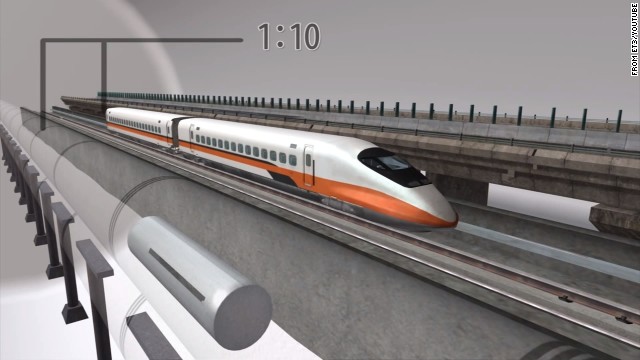A Revolutionary Traveling Method?
Elon Musk, an entrepreneur
involved in many different companies and ideas, has started work on a new form
of national and international travel that can reach speeds of over 3,000 miles
an hour and travel from Los Angeles to New York in a mere 45 minutes. Called
the Hyperloop, it resembles the same technology banks use at the drive through
to take in your deposit. Esssentially, the Hyperloop is a vacuum-sealed
magnetic-levitated train that could zip around the world with virtually no
friction -- allowing for greater speeds. The Hyperloop's rails could be built
above or below ground, and even underwater, a versatility that can
revolutionize the way we travel. Each train of the Hyperloop can fit luggage
and up to six people, and since it can obtain energy from solar power, the
Hyperloop has the potential to create more energy than it could use up -- an
environmental win.
The Hyperloop would dramatically
decrease long distance travel in cars, airplanes, trains, and boats, which
would lower carbon dioxide emissions worldwide if it were used internationally.
Once the Hyperloop is created, it could replace subways and trains, and can
even be altered for commercial use by shipping cargo at a speed we have never
achieved before in the business industry. If Musk is correct in his statement
of it generating more energy than it could use up, it would also serve as a
clean energy source. . . which also allows people to get from America to China
in about two hours. Is this the a win-win invention for the people and the
planet?
 The barrier to the situation,
like almost all things, is money and the willingness of the government to allow
the Hyperloop in cities and across states. Though the Hyperloop is inexpensive
compared to other forms of transportation (it would cost one-tenth of a
high-speed rail and one-fourth of a freeway), it still may be hard to build and
to use as public transportation. The Hyperloop is currently in the private
sector, and would therefore compete against the car, plane, train, and boat
industries, which would create a more competitive travel market and alter the
economy of the entire planet.
The barrier to the situation,
like almost all things, is money and the willingness of the government to allow
the Hyperloop in cities and across states. Though the Hyperloop is inexpensive
compared to other forms of transportation (it would cost one-tenth of a
high-speed rail and one-fourth of a freeway), it still may be hard to build and
to use as public transportation. The Hyperloop is currently in the private
sector, and would therefore compete against the car, plane, train, and boat
industries, which would create a more competitive travel market and alter the
economy of the entire planet.
Personally, I find the Hyperloop
absolutely amazing. I do not see a down side, and people would think that going
over 3,000 miles an hour would be dangerous, but Elon Musk says that there is
no chance of a collision between capsules. The Hyperloop may have a slow start
in the market, but Musk says a blueprint of the prototype may be released next
month. I see no reason why not to do this, and I sincerely hope that dozens of
companies will research the technology to build multiple Hyperloop rails across
the country and across the globe.
This is an amazing technology! I agree that it should be implemented in order to reduce travel times and therefore allow America to be one step ahead of competitors like Russia and China in the transportation sector. However, it may be susceptible to not collision but track issues and small mechanical problems that could lead to a massive high-speed disaster. But all we need are routine checks and good engineers to make sure this doesn't happen!
ReplyDelete